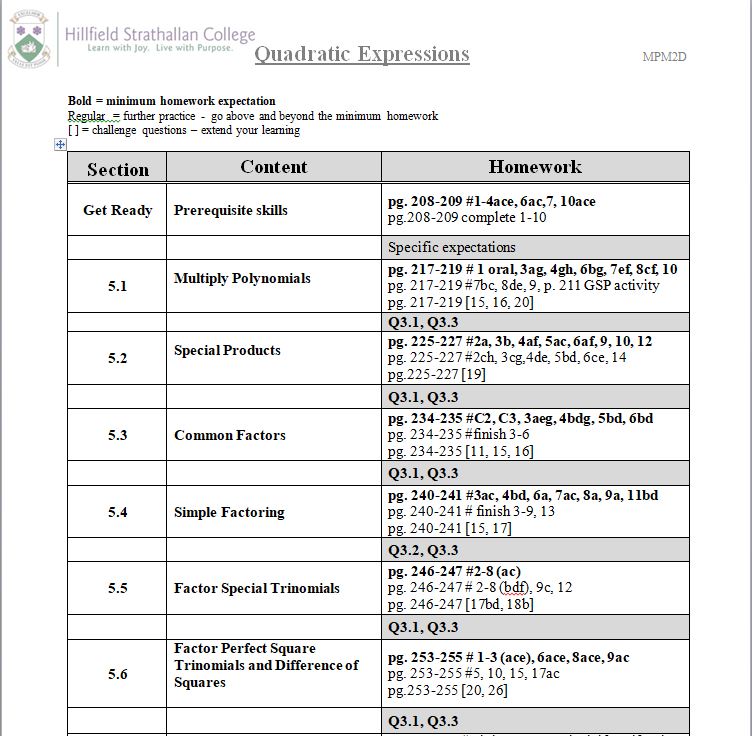The thing that’s been pedagogically “stuck in my craw” recently is my students’ daily homework, specifically, how much math homework is enough?

Our math department’s current homework model is shown below. We have every section’s homework broken down into the categories “Minimum Expectation”, “Further Practice”, and “Challenge Questions”. The problem we continually see is that students attempt the “Minimum Expectation” questions only, then stop, regardless of whether they got the questions right or wrong. This is problematic to us for 2 reasons: First, there are good questions being ignored in the “Further Practice” section, and second and MOST IMPORTANTLY TO ME, my students are not even attempting the “Challenge Problems” which are the Thinking/Inquiry problems defined by KICA, which make up about 20% of our courses. Of course we tell them repeatedly that they need to be consistently trying all the homework questions, but our message only gets through to some of our students.

So we’re looking to revamp how we assign homework (in fact it’s one of our departmental goals for this year) and I’m looking for feedback from the Cohort 21 community (and beyond) on what is the best way to do this.

First and foremost, I think we can go from 3 categories to 2. Something like “Standard Expectation” and “Further Practice, if needed”, and in the “Standard Practice” we could include questions from each of the KICA categories at various levels, thereby ensuring that all students are attempting critical thinking problems on a daily basis. Then, in the “Further Practice, if needed” section, recommend more practice for those who struggled with the initial problems. I’m in the brainstorming phase on this right now and I have some concerns:
- How many problems is enough practice in the “Standard Expectation” section? This is really hard for me because I’ve got 2 competing beliefs in my head. First – Lots and lots of practice creates a solid foundation of knowledge, but, Second – overloading students with too much homework that has repetitive questions makes math not enjoyable.
- Will students (especially grade 9s and 10s) take it upon themselves to try the “Further Practice, if needed” problems? I hate to be glass-half-empty on this one, but in my experience, especially in grades 9 and 10, students actively strive to have as little math homework as possible.
- How can we be more explicit with the “Further Practice, if needed” section? For example, if a student struggled with #8 in the “Standard Expectation” section, how do they know that #10 in the “Further Practice” is similar and should be attempted?
I just read Jen Weening’s blog post (@jweening) on using google forms to ‘create your own adventure’ and I’m excited about the power of this to help direct students to the proper problems for them, but also feeling overwhelmed at the prospect of having to create something like this for each unit in each math course.
I also tried something called Homework Trees last year (I even wrote a blog post about it) which were somewhat successful, but in the craziness of the Spring term last year, I didn’t commit to them every day in every course.
So in conclusion, how might we:
- Make homework purposeful?
- Ensure homework provides enough practice without being repetitive… Unless a student needs it to be repetitive?
- Have our students self-assess when they need extra practice and how to locate that extra practice?
As I said earlier, I’m looking for help on this one, so please leave any feedback/comments/suggestions you may have. THANK YOU!!


Such great questions, @mmoore! I just went back and reread your post on homework trees, and it really does seem as though they’re just an analog version of the “choose your own adventure” forms — using assessment FOR learning to guide the next steps. You’re right that it would be a massive undertaking to try to convert your homework assignments to the digital format, plus you might encounter some additional challenges in your particular subject. For example, the “go to section based on answer” tool only works with multiple choice questions. So it could certainly be a starting point for assessing student understanding, but you’re not going to be able to really have them work through mathematical problems in the same way as they would with a pencil and paper. (However, one tool that would probably help, if you haven’t used it yet, is the Equatio Chrome extension – the full version is free for teachers [sign up here: https://www.texthelp.com/en-us/products/free-for-teachers/%5D and it allows you to create mathematical equations easily for use in the whole Google suite of tools, even Forms! Also integrates with Desmos.)
Your bigger questions about homework are so valuable, as well. This is something that I’ve been struggling with too. Our students spend 8 hours a day at school and then are expected to go home and do hours of homework, as well? How do we find a balance between ensuring students get the amount of practice with concepts that they need to really achieve mastery, and the fact that kids, like teachers, need a break from school in order to achieve balance in their lives??
Wow @michaelmoore what a great post! This is a huge question that we should be all thinking about and investigating! I don’t even call it “homework” in my classroom anymore. I call it “homelearnig”! I am excited to hear about your progress with this topic!
Great post, as always, Mike. I think it ties into your bigger questions on assessment, as well. Do challenge problems or TIPS questions need to be assessed in a traditional “test” environment? Can they be assessed more frequently in an environment where there is more time for thought and reflection leaving “test” questions under more time pressure to be more related to the Standard Practice type questions? Would this focus homework for students and then a few nights a unit could be focused on producing work that is more of a challenge? Does it really matter to student learning that these challenge type questions are never seen in a “test” environment? As usual, I have more questions than answers!
Great post Mike. This really is a long standing question. It is interesting to me that you make the comment about grade 9 and 10 students specifically doing as little as possible. Is this all students or just those that struggle? Are the students who don’t need to do the work doing it and those that need to do it skipping it? Is this an engagement issue? Is this about making it “worth” something for the student or about knowing that your students know the content that they need in order to move forward? I know that we often hear from our students it is about “marks” and the “reason” that they will give for not completing homework is it isn’t marked. I know the hard work that you and your colleagues are putting into this and I respect that there are no easy answers. I have many more questions about this but I know one thing. The hard work that you and your team are putting into this work will surely pay off for your students. Thanks for the thoughtful work.
This one’s a toughy. I also struggle with the balancing of act of assigning enough homework for adequate practice but not an overwhelming amount.
How long are your class periods? My students (and I’m thinking of my MPM2Ds) usually get about a minimum of 20-30 minutes to start their homework in class. This usually allows them to get the straight forward questions out of the way. I bold the more challenging questions so students have a “heads up” but they are still expected to complete them. Sometimes I’ll save those ones until the beginning of the next period and get them to work through the solution in groups.
Another helpful resource that our Math department uses is IXL. Since it assesses if a student’s answer is correct right away, I’ll sometimes assign them to work on a certain concept until they get 10 correct. I find this helps avoid assigning strong students too many questions but forces students who have more difficulty to keep working through it. Unfortunately, it doesn’t have really any “thinking” questions though.
Thanks @kmitchell ! I’ve heard good things about IXL but haven’t explored it in depth. Hopefully we chat on Saturday so I can pick your brain further.
You posed some interesting questions about homework @mmoore. I teach in a Junior School and when I started at my school, they advocated for little to no homework as students needed time to decompress and spend time with family as you mentioned. Now, we are back to assigning about 20 min. of math/night. Like you, I see both sides of the argument. I have noticed though that since we are now assigning math homework more regularly, it has really helped students to grasp concepts at a faster rate and expose them to different kinds of math questions (which preps them for assessments). This is especially true for my students who take longer to master a skill. This practice is very beneficial for them. Even though I want my students to have relaxing time at home, I must say that the practice at home proves to be useful. As you mentioned, I think it’s a question of how much.
It was also interesting to hear about how your students only answer questions that are mandatory. I can see how that is frustrating from a teacher’s perspective. However, as I thought back to my days as a student, I came to the conclusion that I would probably do the same thing. Even though I enjoyed school and cared about doing well, if a teacher told me some problems were optional, I would probably skip them so that I could get other things done instead or finish my homework faster. Although we want students who will challenge themselves or go the extra mile, I don’t know we even do this as adults when presented with the opportunity, especially if we feel stressed or busy. You definitely have an interesting area of exploration ahead of you!
Thank you so much for taking the time to respond @hprosser ! I’m so happy to hear that your students are benefiting from even small amounts of homework, as this has been my personal feeling for a long time, and I’m happy to see it’s paying off.
I totally understand the student mindset of not wanting to do “optional” problems, and we’re hoping to find a way to address this.
Thanks again!
I love the specific nature of your post, @mmoore. Remember to not go too far ahead into solution mode before hearing feedback and asking different questions. For instance, what is your bias here? What if this wasn’t a problem but an opportunity to approach Math differently? I always remember what Sandra Herbst said, “students value what we evaluate”.
Now, it is very easy to translate her statement into, “kids only achieve for marks”, but I think it goes deeper than that.
If you remember I sent you some expectations-based criteria around the Mathematical Process portion of the curriculum. What if the correct answer only got you an 85? What if you then had to communicate a different representation, or find a real-world application for the problem, or a computational one. What if for homework students had to not only demonstrate their standard-expectation practice but also reasoning and reflecting strategies. Now you have Thinking/Inquiry problems not being done as optional, but in order to achieve an observation mark higher than Level 4 (4+ or 5).
If you want to change the student culture around what Math is for, you will first have to change the teacher culture around what Math is for!